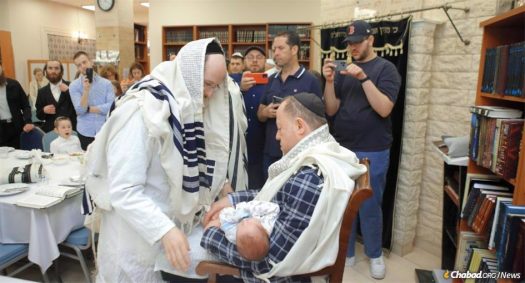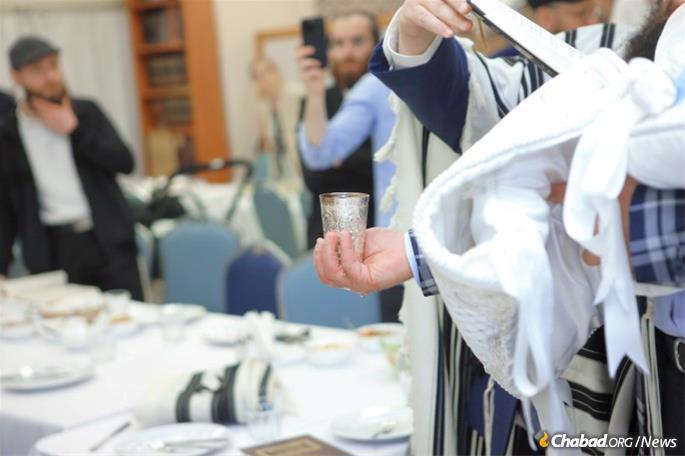
Ukrainian Infant—Born a Refugee—Welcomed into Jewish Community in Warsaw
by Tzemach Feller and Mendel Super – chabad.org
A brit milah (circumcision) is always a cause for celebration, but when a young Jewish boy was brought into the Covenant of Abraham in Chabad-Lubavitch of Poland’s bustling Warsaw center earlier this month, there was a particularly poignant feeling in the room. The infant, named Yissachar at his brit, is the child of Jewish refugees from Ukraine, Maria and Artur Nechaieva, who survived the relentless bombardment of their hometown of Kharkov and fled the country with almost nothing.
Nine months pregnant with her first child, everything was going wrong for Maria. When she should have been taking it easy and resting, her hometown was being blown to bits. Anemic and suffering from high blood pressure, Maria couldn’t stay in Kharkov much longer, and in early March Maria and Artur fled for Kropyvnytskyi (Kirovograd), in central Ukraine. “We thought it would be safe there, but it wasn’t,” Maria Nechaieva tells Chabad.org from safety in Warsaw. “We were being shelled perhaps once every two week weeks, compared to once every two minutes in Kharkov, but we knew we couldn’t stay there for long.” The Chabad emissary in Kropyvnytskyi, Rabbi Dan Zakuta, advised the couple to head for Budapest, one of the Central European cities where Chabad has long-term arrangements for refugees.
They set out, but after reaching Poland and checking into a hotel near the border, Maria felt sick. “It was May 12, at 10 p.m. I had a terrible headache and very high blood pressure.” Alone in a foreign country, Maria didn’t know what to do. She contacted a friend from Ukraine who works as a doctor in Switzerland and her friend searched the internet and recommended a hospital in Warsaw. “They said everything is OK with the baby and that was most important to me.” Her symptoms were caused by the harrowing, long trip she’d experienced, the doctors told her.
Several days later, at a routine checkup, the doctor saw how ill she was feeling and informed her that she needed to stay there: 5 days later, on May 24, less than two weeks after reaching Poland, her son was born.
She was surprised when she got a call from Chabad-Lubavitch of Poland offering her an apartment and help. “I knew Chabad from summer camp in Kharkov as a young girl, and I met Chabad in Kropyvnytskyi, but I didn’t know there was Chabad in Poland,” she says. Rabbi Zakuta in Kropyvnytskyi had given her phone number to his colleague Rabbi Shalom Ber Stambler in Warsaw.
Stambler helped the new parents arrange a brit for the child, bringing in a mohel from Austria. “There was a beautiful lunch after the brit,” says Nechaieva, happy to have been able to celebrate this milestone even while on the run.

“When the war started, and we realized the extent of the unfolding crisis, we knew we had to provide food and housing for the refugees,” says Stambler, who directs Chabad of Poland with his wife, Dina. “The stories are terrible. Refugees arrive here exhausted, injured, ill or newly bereaved, having lost loved ones to the war. Most have never even stepped foot in Warsaw. Our budget has quadrupled since this crisis began, but we feel that it’s our moral obligation to help, and we make it our business to do everything we can.”
Stambler has led the refugee aid campaign, working day and night on the personal concerns of hundreds of refugees each day. Stambler secured the use of a hotel with a kitchen, dining room, and 50 bedrooms, which house some 100 transient refugees on any given day, with another hundred put up elsewhere in the city. Since the refugee crisis began, Chabad has been providing three hot meals a day to more than 400 people. Chabad has hosted more than 1,000 refugees since the outbreak of the war, and each person is provided with what they need, including diapers, strollers, cribs, medicine and medical care, clothing and personal necessities.
Chabad has opened a daycare for refugee children, where they can safely learn and play while their parents focus on rebuilding their shattered lives. They provide classes in English and Polish to help the refugees acclimate, and have placed an emphasis on maintaining their emotional wellbeing as well, providing counseling and mental health services.
“It’s my first baby, and it’s difficult here,” Nechaieva says. “In Ukraine I had many friends; here I have nothing but my family. Now I’m trying to live a normal life.” She worries about her baby; he is small and not gaining enough weight, and the language barrier is only making the first-time-parent struggles more difficult.
She worries about her friends and family back home. “Nobody knows how long it will be. My parents have nothing—they lived in occupied Izyum. In Kharkov it’s terrible, they’ve destroyed schools and hospitals, every day there are a lot of victims.” Nechaieva has no idea if her apartment in Kharkov still stands. “My husband’s uncle had a heart attack and died because he was so worried; it would be cruel for me to think about my house because it’s material. I’m more interested in knowing if my friends and family are OK.”
Like so many of the Jewish refugees coming out of Ukraine, Nechaieva’s primary exposure to Judaism was through Chabad. Growing up in Izyum, she says she had very little Jewish education locally, except for each summer when she attended Chabad of Kharkov’s summer camp. “It was a big job for our teachers,” she recalls. “In Izyum we had a Jewish community, but they didn’t teach us to pray, Jewish history, we didn’t celebrate Shabbat—Judaism was ‘just for fun’ there. At Chabad camp we were taught our history, how to pray and all other things; our small town didn’t have this ability, it couldn’t give us what camp gave us.”

A Growing Challenge as the Crisis Continues
As the crisis has continued for close to four months, Chabad of Poland has taken on the challenge of finding more permanent housing for the refugees in its care. To date, some 15 families are being resettled in apartments, the cost of which is astronomical as landlords have been requiring a year of rent—more than $18,000—up front. Chabad of Poland has risen to this challenge as well and is providing the rent payments, utilities as well as furniture and household goods for these indigent families as they begin to become self-sufficient again.
Rabbi Mayer Stambler, who has headed the fundraising efforts made necessary by this crisis, noted the groundswell of support Chabad of Warsaw has received in recent weeks, with communities from around the world contributing to the humanitarian efforts to save lives and help those who have fled the war rebuild anew.
“While the need continues to grow, the outpouring of support from Jewish communities around the world has been heartwarming,” he said. “We are hopeful that this will continue, as more and more families continue to join the refugee community here in Warsaw.”
And as one of those families welcomed their son into the Covenant of Abraham, the Warsaw Chabad community joined them in celebrating the birth of new life. “We don’t know what will be tomorrow, we’re just trying to live,” says Nechaieva.
For more information and to donate to Chabad of Warsaw’s comprehensive relief efforts, visit Charidy.com/plitim.
This article was reprinted with permission from chabad.org











